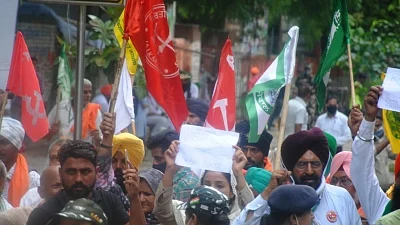If Modi govt expects farmers’ agitation to dissipate over time, it is in for a rude shock
The farmers’ protest is showing all signs of escalation in other states, particularly in poll bound states such as in Uttarakhand and Uttar Pradesh where assembly polls are due next year

Farmers assembled at Jantar Mantar on July 22 staged protests and organized a ‘Kisan Sansad’, not far from the Parliament of India, which is in session. While the farmers’ ‘Parliament’ debated the APMC Act in two sessions, punctuated by a ‘langar’ on the first day, both the Houses of Parliament resonated with their demands, which was one of the reasons for their adjournment for the day.
While the opposition was demanding ‘justice for farmers’, a Union minister from the ruling BJP was calling the farmers ‘hooligans’ in a press conference, a comment she had to withdraw, but only after sharp reaction from as far as Punjab, with Chief Minister Capt Amarinder Singh demanding her “immediate resignation” over it.
All these indicate that farmers’ agitation is going to continue for a long time to come. Modi government is not showing any genuine concern about the farmers. At a time when farmers are agitating against the three farm laws, Modi government has come with an electricity bill which will further complicate the matter.
Punjab farmers have already become restive against this Electricity Bill of 2021. The Modi government is thus hardening its stand, which is unlikely to deter the farmers.
What happened on July 22 in Delhi is nothing less than reaffirmation of the respective stands of both sides – the Modi government bent upon implementing the three controversial farm laws, and the agitating farmers sticking to the demand of repealing the same.
The opposition is equally resolute in supporting the farmers’ cause. When Union Minister of Agriculture Narendra Singh Tomar arrived at the Parliament, opposition MPs protesting outside Parliament flashed pro-farmers placards at him. He reiterated the government ‘commitment’ to engage the farmers, but with a condition that the farmers should flag specific objections to the laws in question.
He has been all along claiming on behalf of the Modi government that the three farm laws are for the benefit of the farmers, but his claim was rejected by the farmers in the ‘Kisan Sansad’, which called it “hollow” and the three farm laws as ‘anti-farmer’. Farmers said that he should visit ‘Kisan Sansad’ to understand their concerns.
Farmers’ agitation will become eight months old on July 26, which will be another milestone in the history of Indian farmers’ movement. Multiple rounds of talks have failed to yield any result. The 11th round failed on the eve of Republic Day on January 26, 2021, and thereafter there has been no signs of the talks resuming.
The Union government is not taking any initiative for fresh talks, but has been reiterating that it is “ready for talks” if “farmers have any specific objection” on the three laws. Farmers, on the other hand, have been reiterating their demand of “not less than repeal of the laws”.
Farmers’ agitation is showing all signs of escalation in other states, particularly in poll bound states in the early 2022, such as in Uttarakhand and Uttar Pradesh. Quit India Day, August 9, will be observed by agitating farmers in Uttar Pradesh as “Modi Gaddi Chhodo’ day and will continue thereafter. Kisan Mahapanchayat will be organized in Uttar Pradesh in September.
Only recently, a Kisan Mahapanchayat was organized in Haryana to protest against sedition cases registered against agitating farmers. The Kisan Mahapanchayat in September will ask farmers not to vote and support the BJP in coming Vidhan Sabha election in Uttar Pradesh.
Only a few hundred metres away from the protest site at Jantar Mantar, the opposition MPs, including those of the Congress, SAD, and AAP staged a protest inside Parliament complex demanding repeal of the three farm legislations. Congress leader Rahul Gandhi led a protest by party MPs at Parliament complex, expressing solidarity with agitators at Jantar Mantar.
The situation at the protest sites at Jantar Mantar, and the three borders -- Singhu, Ghazipur, and Tikri -- has become tense with all indications of intensifying of the agitation and its spread in several states. On the second day of the protest at Jantar Mantar, i.e. on July 23, farmers organized a ‘Kisan Mahapanchayat’. In the ‘Kisan Sansad’ they had decided to carry on protest till August 13 as against the original permission until August 9, the period for which LG of NCT Delhi had given them permission to organize the same, with the condition that not more than 200 farmers should participate. It may be noted that Monsoon session of the Parliament will end on August 13.
Modi government had enacted the three farm laws in September 2020, and farmers have been agitating since then. ‘Dilli Chalo’ call was then given to farmers, and the farmers from Punjab, Haryana, and Western Uttar Pradesh followed suit, braved hurdles in the way by BJP-led governments in Haryana and Uttar Pradesh, and finally reached Delhi borders on November 26, where they were stopped by Delhi Police. They were not allowed to enter Delhi and therefore they sat on sit-in protest on three places – Singh, Tikri, and Ghazipur.
They braved the biting cold, scorching sun, and the rain. They have also got support of central trade unions, bank and insurance employees unions. They had also organized all India stirs, from Bharat Bandh to protests at state and district headquarters, and even at village levels. With passage of time, the agitation is only likely to intensify rather than peter out as the Modi government is clearly hoping for.
(IPA Service)
Views are personal
Follow us on: Facebook, Twitter, Google News, Instagram
Join our official telegram channel (@nationalherald) and stay updated with the latest headlines
